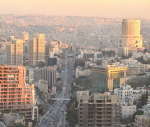You are here
Press freedom is crucial for democracy and stability
May 03,2018 - Last updated at May 03,2018
Today is World Press Freedom Day. Sadly enough, we celebrate this day in a world where many journalists wake up imprisoned and where people are punished for using their right to express their opinion. We have in the last years seen a backlash in freedom of expression in many countries around the world, especially in the Middle East, and even in Jordan. Jordan, with its proud history of being a good example of press freedom, could do more and Sweden will continue to support the work to secure everyone’s right to speak and think freely.
Freedom of expression constitutes one of the fundamental rights of every human being. Our urge to express ourselves is a major part of what it means to be human. The free exchange of ideas and opinions has for centuries been the driving force behind new discoveries and knowledge, and it has made human civilisation progress and flourish. Our horizons further expand through cultural expressions such as art, music and poetry.
Today on World Press Freedom Day we should remind ourselves that a free media is the most powerful watchdog against corruption, power abuse and injustice. It serves as a vaccine against oppression. As a European, I am fully aware of this. Our history has taught us all too well what can happen if we do not give space to pluralism and if we muzzle news agencies that stand up against anti-democratic forces.
On December 2 1766, the Swedish parliament adopted the world’s first Freedom of the Press Act. This law abolished censorship of printed publications and secured the right of every citizen to have access to public documents and take part in political debates. This, in turn, was crucial for the coming democratic development in Sweden. And when the European Union was formed in the aftermath of the atrocities of the World War II, freedom of expression and freedom of the media were included as essential components of the democratic principles of the new European project. Europe had learned the hard way that the bumpy road forward is one of plurality, openness and free exchange of ideas and opinions.
Jordan has long been an Arab example to follow when it comes to press freedom. When neighbouring countries have silenced critical voices, Jordan has understood the value of a society where people can express and exchange their ideas in the public realm. The freedom of expression and media freedom are laid down in the Jordanian constitution, and Jordan was the first country in the region to adopt a law on the right of access to information.
Recently, however, we have seen some worrying trends. Individuals and organisations who have used their constitutionally granted right to publish, express their opinions and promote media freedom have been targeted. Jordanians who have shared their views on social media have been unjustly detained, on the basis of vague anti-terror, cyber crime and defamation laws. Further impediments to qualitative media and Internet freedom in Jordan include widespread self-censorship among journalists and undue legal obstacles for Internet-based media outlets.
Jordan is situated in a region shaken by turmoil. Some might therefore ask: Can we really afford unrestricted freedom of expression in times of conflict and upheaval? Should not stability and security be our first priority? Actually, peace and stability would gain from thinking these questions through. The right question to ask ourselves is: can we really afford to compromise the freedom of expression and all the long-term benefits that it brings in terms of innovation, diversity and prosperity?
Stability and freedom of expression are far from two conflicting concepts. History tells us that they reinforce each other. Media freedom breeds security.
Jordan just climbed six places to 132 out of 180 on Reporters Without Borders’ press freedom index (where Sweden scored second). Jordan can do better. It is now more important than ever that Jordan, with its good track record on media freedom, shows true leadership through defending these inviolable rights. It is therefore positive that Jordan’s national plan for human rights for 2016-2025 focuses on freedom of opinion and expression as areas for further action. According to the national plan, journalists and media workers should obtain sufficient protection while performing their work and violations of the freedom of opinion should be monitored.
The lesson we have learned in Sweden with over 250 years of press freedom is the following. When citizens have the right to freely scrutinise and assess institutions of society, it leads to better governance. When leaders are held accountable for their actions in the eyes of the public, they make wiser decisions. When citizens have the right to access information, corruption is reduced. When journalists ask tricky questions, they do not jeopardise security. In fact, transparency lays the foundation of a more stable society; a society where citizens have trust in their authorities and feel that their voices are listened to; a society where citizens take part in, and take responsibility for, their country’s future.
The writer is the ambassador of Sweden to Jordan














